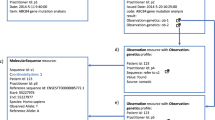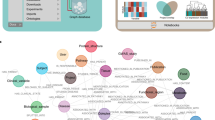Abstract
Genomic profiling is beginning to extend beyond the many applications in discovery research toward direct medical applications that hold the promise of more precise and individualized health-care delivery. There are many barriers and challenges that still need to be overcome before ‘Precision Medical Genomics’ can deliver the promise of more informed patient care, not the least of which is the unmet need for a new conceptual framework for recovering, understanding and translating potentially useful information from a single genome. Although a wide spectrum of scientific strategies, bioinformatic approaches, IT tools and knowledge resources have been developed to support discovery research, the interpretive requirements for recovering clinically useful insights from an individual's genome are different in many ways from those of traditional research goals. In this study, we compare and contrast the fundamental conceptual differences that distinguish ‘research’ to discover generalized knowledge from ‘search’ to recover individualized knowledge. We also consider the merits of applying evidence-based medicine and traditional scientific methods when n=1, and consider an alternative perspective based on a translational engineering approach and intelligence for interpreting genomic information from an individual case. Although the general idea of biological intelligence-based knowledge recovery that we introduce here can be broadly applied for personal genomics across many indications in medicine, we make a case that the need for adopting such a paradigm is greatest for supporting the management of complex diseases, and particularly suited for supporting therapeutic decisions in medical oncology. Early concepts for designing and implementing this kind of ‘BioIntelligence’ solution will be discussed. We also review the anticipated challenges of implementing genomic analysis and biological intelligence-based solutions in the practice of medical oncology by discussing some of the related pragmatic considerations for deploying the first generation of a ‘Precision Medical Genomics’ solution that can evolve and improve over time.
This is a preview of subscription content, access via your institution
Access options
Subscribe to this journal
Receive 50 print issues and online access
$259.00 per year
only $5.18 per issue
Buy this article
- Purchase on Springer Link
- Instant access to full article PDF
Prices may be subject to local taxes which are calculated during checkout


Similar content being viewed by others
References
Brody JE . (2009). Buyer beware of home DNA tests. The New York Times. The New York Times Company: New York, p D6.
Chen H, Ding L, Wu Z, Yu T, Dhanapalan L, Chen JY . (2009). Semantic web for integrated network analysis in biomedicine. Brief Bioinform 10: 177–192.
Church GM . (2005). From systems biology to synthetic biology. Mol Syst Biol 1: 0030.
De Leo G, LeRouge C, Ceriani C, Niederman F . (2006). Websites most frequently used by physician for gathering medical information. AMIA Annu Symp Proc, p 902.
Dougherty ER . (2008). On the epistemological crisis in genomics. Curr Genomics 9: 69–79.
Fox EJ, Salk JJ, Loeb LA . (2009). Cancer genome sequencing--an interim analysis. Cancer Res 69: 4948–4950.
Guise TA, O’Keefe R, Randall RL, Terek RM . (2009). Molecular biology and therapeutics in musculoskeletal oncology. J Bone Joint Surg Am 91: 724–732.
Hawkins J, Blakeslee S . (2004). On Intelligence. Times Books: New York.
Kaye J . (2008). The regulation of direct-to-consumer genetic tests. Hum Mol Genet 17: R180–R183.
Klein RJ . (2007). Home-based technologies: a new paradigm for conducting dementia prevention trials. BMC Genet 8: 58.
Kurzweil R . (2005). The Singularity is Near: When Humans Transcend Biology. Viking: New York.
Li X, Quigg RJ, Zhou J, Gu W, Nagesh Rao P, Reed EF . (2008). Clinical utility of microarrays: current status, existing challenges and future outlook. Curr Genomics 9: 466–474.
Manning M, Aggarwal A, Gao K, Tucker-Kellogg G . (2009). Scaling the walls of discovery: using semantic metadata for integrative problem solving. Brief Bioinform 10: 164–176.
Powell IJ, Carpten J, Dunston G, Kittles R, Bennett J, Hoke G et al. (2001). African-American heredity prostate cancer study: a model for genetic research. J Natl Med Assoc 93: 25S–28S.
Qu XA, Gudivada RC, Jegga AG, Neumann EK, Aronow BJ . (2009). Inferring novel disease indications for known drugs by semantically linking drug action and disease mechanism relationships. BMC Bioinformatics 10 (Suppl 5): S4.
Ruttenberg A, Clark T, Bug W, Samwald M, Bodenreider O, Chen H et al. (2007). Advancing translational research with the Semantic Web. BMC Bioinform 8 (Suppl 3): S2.
Schleutker J, Matikainen M, Smith J, Koivisto P, Baffoe-Bonnie A, Kainu T et al. (2000). genetic epidemiological study of hereditary prostate cancer (HPC) in Finland: frequent HPCX linkage in families with late-onset disease. Clin Cancer Res 6: 4810–4815.
Smith JR, Freije D, Carpten JD, Gronberg H, Xu J, Isaacs SD et al. (1996). Major susceptibility locus for prostate cancer on chromosome 1 suggested by a genome-wide search. Science 274: 1371–1374.
Varmus H, Stillman B . (2005). Support for the Human Cancer Genome Project. Science 310: 1615.
Von Hoff DD, Stephenson JJ, Rosen PJ, Loesch DM, Borad MJ, Anthony SP et al. (2009). 100th Annual Meeting of the American Association for Cancer Research, Vol LB-259: Proceedings of the 100th Annual Meeting of the American Association for Cancer Research. AACR: Denver, CO.
Acknowledgements
We wish to acknowledge Meraj Aziz, Ashish Choudhary, Quick Que, Ed Suh, Joachim Petit, Nathalie Meurice, Michael Barrett, John Carpten, Michael Bittner, Pierre Plumer, Thibaud Latour, Zoe La Croix, Chris Yoo, and Frank Prendergast for insightful discussions that helped us shape the views and perspectives presented in this review. This work was supported in part by NIH Project Program P01 CA109552.
Author information
Authors and Affiliations
Corresponding author
Rights and permissions
About this article
Cite this article
Mousses, S., Kiefer, J., Von Hoff, D. et al. Using biointelligence to search the cancer genome: an epistemological perspective on knowledge recovery strategies to enable precision medical genomics. Oncogene 27 (Suppl 2), S58–S66 (2008). https://doi.org/10.1038/onc.2009.354
Published:
Issue Date:
DOI: https://doi.org/10.1038/onc.2009.354



